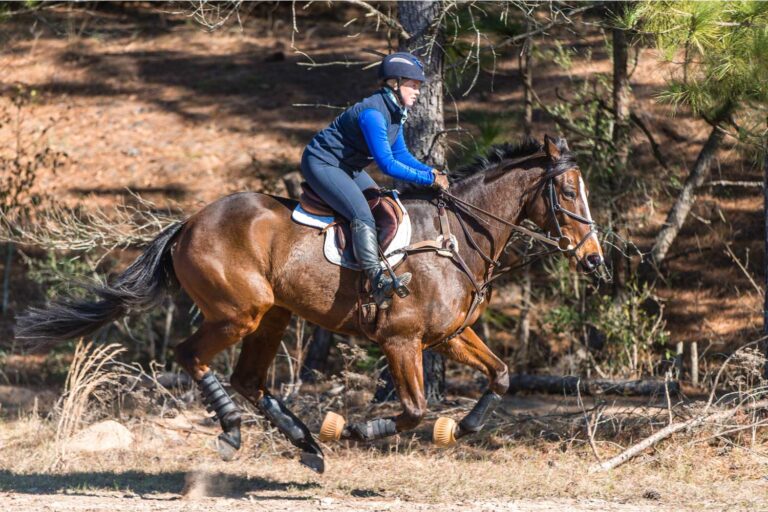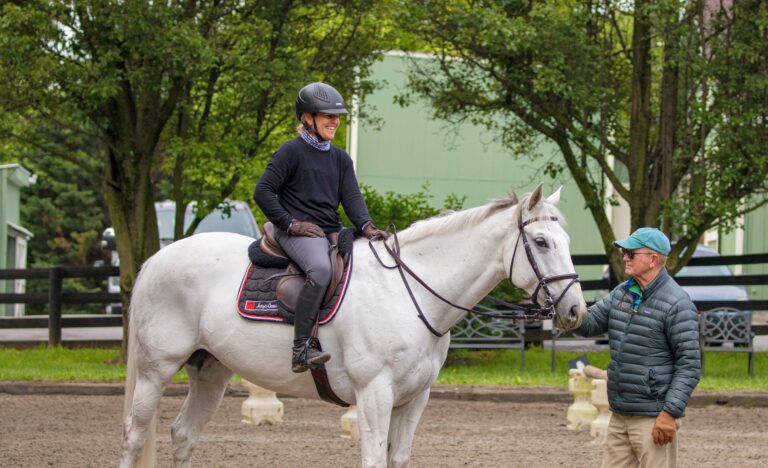 Before my lesson starts, I want to make sure the students know what we are going to do and how I want them to ride through the exercises. This is a young-horse semi-private lesson, which is nice because it means that I do not have to school at two levels at once. As usual, my instructions to a group at this level are, “Put your horses on as loose a rein as possible, don’t let them refuse, don’t let them run out, then don’t ride.” When dealing with young horses, I want the horse to do as much of the jumping on his own as possible. I accept that my riders are inexperienced and will arrive at some fairly esoteric distances at the obstacles. I need for the horses to know what to do when the distance is not perfect. If you are going to teach for a living, you should protect your voice by not teaching at a high volume. I use a small portable waist-pack loudspeaker, available at many Internet outlets, to save my voice. | © Rachel Wilks
Before my lesson starts, I want to make sure the students know what we are going to do and how I want them to ride through the exercises. This is a young-horse semi-private lesson, which is nice because it means that I do not have to school at two levels at once. As usual, my instructions to a group at this level are, “Put your horses on as loose a rein as possible, don’t let them refuse, don’t let them run out, then don’t ride.” When dealing with young horses, I want the horse to do as much of the jumping on his own as possible. I accept that my riders are inexperienced and will arrive at some fairly esoteric distances at the obstacles. I need for the horses to know what to do when the distance is not perfect. If you are going to teach for a living, you should protect your voice by not teaching at a high volume. I use a small portable waist-pack loudspeaker, available at many Internet outlets, to save my voice. | © Rachel WilksMy column is usually written for riders. I have been teaching for half a century, have learned some lessons along the way and thought that this month it might be useful to talk about those lessons with readers who are also professionals.
If you are a professional, then (according to Webster’s Dictionary) you are engaged in an activity that you consider your “principal calling, vocation or employment.” It is understandable that the employment part of Webster’s definition looms large in your thoughts. After all, this is the way you make your living. However, you should not overlook another characteristic of professionals that Webster provides; you are employed in “a type of job that requires special education, training or skill.” These are the attributes I’m going to explore.
Education Through Mistakes
That old adage that you learn more from your failures than from your successes is especially true when applied to horses. We are all going to make mistakes. It’s what happens after the mistake that matters. Do we learn from it or not? Mistakes are part of your life as a coach, and you have to accept that. Most of the mistakes that you deal with, either as a rider or as a coach, are mistakes that I—or others just like me—have already made. And while we made those mistakes, our horses suffered the effects. I got over-caffeinated while teaching a group lesson the other day and went down in the weeds about some arcane point of riding theory. One young lady who had never considered things in that sort of detail remarked to me that by now I “must have a master’s or a doctorate or something.” I was flattered and thanked her, but said, “That might be true, but my horses paid my tuition.”
We professionals have good solutions for many mistakes. Why? Because we learned from people who had made those same errors. They kept us from duplicating their blunders or quickly corrected us if we were on the wrong path.
Education Through Books
In addition to learning from their own and others’ mistakes, all professionals have a responsibility to continue their formal education. This means you should consider modern periodicals to be required reading and you should also read at least one or two serious books a year. Think about it. Books about riding and training are really compilations of your fellow professionals’ mistakes and solutions. Like the guidance of your own trainer when you were getting started, books are a continuing opportunity to avoid a mistake in the first place, rather than needing to repair it later.
Studying books on riding theory will make you a better trainer in many ways. For instance, next to creating an awareness of your students’ responsibility for their horses, probably the most important thing you can do for them is to teach them a good position. To teach it, you first have to know it, and that means study and reflection. Any good book on riding theory will have excellent advice on the correct mechanics for the dressage or jumping position. The vast majority of mistakes that your students make will be due to a faulty position. If you fix the position, you will oftentimes fix the mistake.
As your professional knowledge base expands, you will notice that not every expert says the same thing. For example, some dressage experts emphasize an equal and firm contact with the horse’s mouth while others emphasize lightness. Who do you think is right? Some show-jumping experts want their students to remain in a two-point position all the way to the jump while others want their students seated in the approach. Which technique do you teach and why? My own answer is that either of those systems will work for different horses. You need a basis of knowledge broad enough to enable you to apply the appropriate system for each horse-and-rider combination.
Although you will spend a great deal of your time retraining horses and riders, think how much easier your life would be if your horse had not been taught to rush at the obstacle or your student had already learned to ride with her legs, not her hands.
Sometimes Skill Means Patience
Now we come to professional qualities that are harder to define (and sometimes harder to acquire) than technical expertise. Chief among them is PATIENCE, probably the most important characteristic of the horseman. It takes a long time to train a horse or a rider. One of my many heroes, Hall of Fame West Coast hunter/jumper trainer Jimmy Williams, said, “People always have time to do it over.” Obviously, he meant that if you did it right the first time, you wouldn’t have to do it over.
You already know that patience with your horses is essential, but you have the same duty to your students. When I have a break in the warm-up ring, I listen to other coaches interacting with their students. This is actually part of my own continuing education, as I usually pick up a new phrase or description that I can use in my own teaching. It is interesting, however, how many coaches are obviously frustrated with their students’ mistakes and how sharply (and audibly) critical they are. I think this approach is rarely the best solution.
First, riders don’t intentionally get it wrong. They don’t miss their distance to the warm-up oxer just to make you mad. If you find yourself getting irritated, consider whether your expectations for that student are too high for now, especially in competitive circumstances. Also, ask yourself whether you are secretly embarrassed to have a student perform below your expectations in front of your fellow coaches. If those coaches know their stuff, they will be sympathetic rather than critical. If they don’t know what they’re doing, it doesn’t matter what they think. (Anyway, don’t be too critical of bad riding—when you think about it, bad riding means job security for you.)
Organize Your Information
If you have learned from your continuing education, you will have a wide range of tools to help your riders. However, your clarity of expression must be preceded by clarity of thought. If your answer to a student’s question is long and rambling, make a mental note to write down the question later on and reconsider your answer. There’s no time for long, involved answers in a one-hour lesson or in the short time available to you in the warm-up ring. Keep a list of recurring questions and write down some thoughts or bullet points about each topic. This will help you answer in a more concise manner the next time somebody asks. Over time, you will develop your own book about riding and coaching.
Riding and teaching are endlessly fascinating activities, and you can make an honest living from them. There are few things in life that you find more rewarding than feeling a young horse improve because your own technique develops or watching a student and her horse change because you suggested an exercise that helps them correct a problem. By the application of your acquired skill and knowledge, you are able to change someone’s life for the better, and that is a wonderful gift. People will remember that experience for the rest of their lives.
You can take a certain amount of pride in your influence, but keep in mind that your students have an existence outside your world. Horses make smart people do dumb things and that can affect your attitude toward your students, but keep a sense of perspective about them. A dumb mistake learning to interact with a thousand-pound horse doesn’t make a person dumb; he or she is just inexperienced. I got my nose rubbed in this fact early in my career. A young lady was coming for lessons and she badly needed them; she had an unusual capacity to repeat her errors. While on the road one day, however, I heard her distinctive voice on CNN news: She was skillfully and ruthlessly ripping apart a U.S. senator who was woefully misinformed about her area of alleged expertise. The next time my student came for a lesson, I asked her about this incident. “Oh, yes,” she replied, “I have to testify on Capitol Hill about once a month. Say, did I tell you the cutest thing my horse did the other day?”
In the course of my career I have taught rocket scientists, surgeons, powerful attorneys and many others. I have always secretly wondered if they might be better at their profession than I am at mine. All I can do is continue learning about my profession of teaching and try to improve along with my students and their horses. I was struck by an exchange written by Robert Bolt for his play A Man For All Seasons. In it, a character asks the protagonist, Sir Thomas More, for advice about his life and career.
Richard Rich: “If I was [a fine teacher], who would know it?”
Sir Thomas More: “You, your pupils, your friends, God. Not a bad public, that.”
And not a bad life, either, spent riding and teaching.
This article originally appeared in the August 2016 issue of Practical Horseman.










